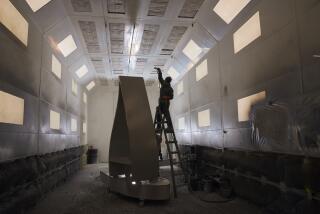Green trade shows are starting to feel recycled
- Share via
A cottage industry has sprouted in the environmental movement, but it has nothing to do with wind turbines or carbon offsets.
The green scene has been flooded with conferences, conventions, trade shows and other events trying to capitalize on the popularity of sustainability and concerns about climate change. Most of the meetings deal directly with environmental issues such as carbon emissions, conservation or alternative energy. Even some industry trade shows, such as electronics and textiles, have green elements, including special pavilions and panel discussions.
There are conferences for event organizers, detailing how to run meetings that use sustainable carpets and biodegradable trash liners and avoid bottled water and printed schedules.
There are so many, even the most gung-ho of eco-mongers claim to suffer conference overload.
“It’s a huge amount of money,” said Stephanie Corbin, senior assistant editor at Tradeshow Week magazine. “Before the economic downturn, green was the hot topic. While it’s definitely slowed and was put on the back burner for the recession, I don’t think it’s going away.”
Nationally, at least 40 annual shows claim some sort of green focus, with many more local variations, Corbin said. And despite the turbulent economy, experts said a surprising number are thriving, helped by investments, government incentives and publicity.
Over two weeks in November, at least five green conferences were held in the West, including green business events at UCLA and in San Francisco as well as a green building expo in Phoenix.
In October, Solar Power International sold out its Anaheim exhibit floor with more than 900 exhibitors -- double the number the year before.
The event, held by the Solar Electric Power Assn. and the Solar Energy Industries Assn., was one of the 50 fastest-growing trade shows of 2009, according to Tradeshow Week. The Windpower Conference & Exhibition, held by the American Wind Energy Assn., topped the list.
Some events are so similar they cause deja vu, attendees said. An evergreen squad of experts and speakers, such as actor and activist Ed Begley Jr. and former Vice President Al Gore, are regulars on the green conference circuit.
The array of options can be bewildering.
“There are so many green conferences, so many options, that you don’t know which ones you should go to,” said Julie Dawoodjee, spokeswoman for Los Angeles clean energy company Rentech Inc.
In 2009, the company kept a 29-page master calendar filled with 91 renewable fuels meetings and aviation and investor shows. Rentech attended just 36.
The choices can be expensive: A full pass to attend the Renewable Energy Technology Conference & Exhibition in Washington this month cost $795, the same as the Pacific West Biomass Conference & Expo in Sacramento last month.
Many green events never make it to the convention center, weeded out by low attendance, bad word of mouth and the unpredictable economy.
“Like any other industry, people will try to hop on the gravy train, and some are good at it and some aren’t,” said Deborah Sexton, chief executive of the Professional Convention Management Assn.
Because of low interest, the Washington advocacy group Citizens for Energy Freedom had to cancel its January 2009 conference and refund registration and dinner fees. Florida was the original site, but the group instead held a “virtual conference” online in May.
The earthNOW expo planned for Las Vegas in June was canceled when too few people registered. The year before, the $70,000 event had been a money-loser, said show director Bob Peters.
An entrepreneur who runs a trade show display rental business as well as a muscle car club, Peters said he is no “green guy,” just someone who saw a business opportunity.
But only 700 attendees of the 2,500 Peters had initially hoped for showed up. Of about 50 exhibitors, very few had professional displays, he said. The event was moved from a large hall at the Las Vegas Convention Center into a smaller ballroom.
Still, Peters tried to hold a second expo, even offering free booths to exhibitors from the first event. Only 15 companies responded. Baffled and fed up, Peters walked away.
“I thought people were in the green business for the same reason I was,” he said. “But to too many people, the environment was first and money was second.”
Those putting on gatherings that focus on environmental issues have to make sure their own eco-houses are in order, a concern that is reflected generally in the meetings industry.
More events are touting their recycling policies and energy-efficient facilities, said Sexton of the convention association. Others provide bicycles and carpools for attendees and promote the use of public transportation.
Four events last year were certified by the Cleaner + Greener program, sponsored by the nonprofit sustainability group Leonardo Academy, for reporting their greenhouse gas and health-related emissions and offsetting at least 50% of the greenhouse gas discharges.
The Green Meeting Industry Council, an organization dedicated to encouraging sustainability in the conference industry, held an event this month to discuss tactics for making meetings more eco-friendly.
“Any center that is not taking this seriously is making a terrible mistake,” Sexton said. “Those trends would be very smart on the business side.”
At the Greenbuild International Conference and Expo in Phoenix in November, the U.S. Green Building Council used biodegradable, corn-starch table coverings and signs recycled from the year before, said Kimberly Lewis, vice president of conferences and events. Registration was electronic, and the rest of the event used only recycled paper. More than 300 volunteers staffed more than 50 recycling stations, and all partner hotels signed “green” contracts to reuse towels and sheets and use eco-friendly cleaners.
The expo generated more than $30 million in spending for the Phoenix economy and drew more than 27,000 attendees and 1,800 exhibitors.
Small details can make or break a conference for Santa Monica company Pure Power Distribution, which sells mobile solar panels. The firm calculates the carbon footprint of event travel, and usually shuns shows on the East Coast.
Pure Power was picky when choosing the six or so green events that it attended last year, spokesman Christopher Smith said.
“In this environment,” he said, “you have to be very, very prudent.”
More to Read
Inside the business of entertainment
The Wide Shot brings you news, analysis and insights on everything from streaming wars to production — and what it all means for the future.
You may occasionally receive promotional content from the Los Angeles Times.











